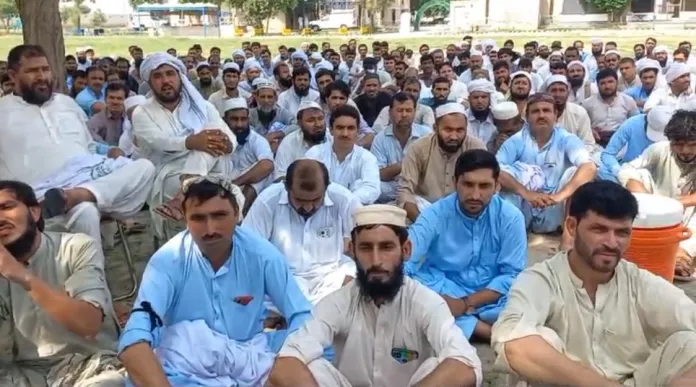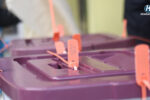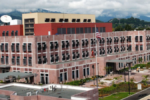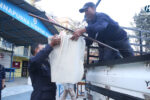Amid a surge in militant attacks on security personnel, hundreds of policemen have been staging protest since Sunday in the Lakki Marwat district of Pakistan’s northwestern Khyber Pakhtunkhwa (KP) province, demanding that the counterterrorism drive in the region be led by them, instead of the military, as they feel vulnerable on duty.
Protesting against the militant attacks on police personnel, cops have set up a sit-in on the main Peshawar-Karachi Indus Highway, blocking traffic on the route.
According to local media reports, due to the sit-in, traffic on the highway has been completely disrupted, cutting off the KP from the rest of the country.
Days ago, negotiations between the protesters and local authorities failed to reach a solution.
The protesting police personnel stated that there are only two ways to lift their sit-in and open the highway – either the military and its agencies should withdraw from Lakki Marwat district, or the road could be opened by “martyring” them, as they had “come prepared to sacrifice their lives”.
Policemen from neighboring districts, including Karak, Bannu, Tank, and Dera Ismail Khan, have joined the sit-in in large numbers, while people from across the district are also arriving in groups to support the protest.
For instance, the deployment of army personnel for internal security operations can sometimes be viewed as encroaching upon the police’s domain, which may lead to disagreements over command and operational control.
According to an editorial published in Pakistan’s leading English daily the Dawn, the concerns of the police are indeed justified as recent statistics reveal a troubling situation in KP, where August alone witnessed 29 terrorist attacks resulting in 25 fatalities.
Lakki Marwat and its neighboring districts have been particularly hard-hit by terrorism, with police officers, security personnel, and government officials being the primary targets, as per reports.
The fact that police officers have taken to the streets to protest highlights the severe state of law and order in the region, the editorial said.
Low police morale and the necessity for law enforcers to publicly voice their grievances signal a failure on the part of both the administration and security forces to effectively combat militancy.
The support from local civilians for the police’s demands underscores the gravity of the situation, as per reports.
The KP administration and security forces appear to be preoccupied with political issues, neglecting the urgent need to address militancy with the seriousness it demands, the editorial read.
Meanwhile, the protesting law enforcers also demanded withdrawal of the army from the counterterrorism drive, saying the police department needed to be empowered to restore peace and stability in the volatile region.
The roots of the complex dynamic between Pakistan’s police and army can be traced back to the country’s formation in 1947.
Pakistan inherited a colonial administrative structure where the military held significant sway, and the police force was largely modeled after the British system.
Over the decades, the interplay between these two institutions has been influenced by various factors, including political instability, security concerns, and shifting governance priorities.
One of the main sources of tension between the police and army is the broader issue of civil-military relations.
The military’s historical involvement in politics and governance has often overshadowed civilian institutions, including the police.
This dominance can lead to friction, as the police sometimes feel undermined or side-lined in matters that overlap with military interests.
There are also jurisdictional issues where the roles and responsibilities of the army and police can blur, leading to potential conflicts.
Combating terrorism requires a coordinated effort involving the police, counter-terrorism department, intelligence agencies, and the military, and it is crucial that the administration, while negotiating with the protesting police, takes into account their concerns and those of the local civilians who bear the brunt of security operations, according to the editorial.
For instance, the deployment of army personnel for internal security operations can sometimes be viewed as encroaching upon the police’s domain, which may lead to disagreements over command and operational control.
Rivalries between institutions further exacerbate tensions.
Issues of authority, resource allocation, and differing operational priorities can lead to friction.
The perception of one institution being more influential or better equipped than the other can contribute to ongoing disputes.
The Dawn editorial, however, opined that police personnel, who are on the front lines in the fight against terrorism, must have their concerns addressed.
As these protesting law enforcers have called for, they need greater support and empowerment to tackle terrorist groups effectively, the editorial said.
Combating terrorism requires a coordinated effort involving the police, counter-terrorism department, intelligence agencies, and the military, and it is crucial that the administration, while negotiating with the protesting police, takes into account their concerns and those of the local civilians who bear the brunt of security operations, according to the editorial.
Developing a robust and responsive counter-terrorism strategy is essential to address the menace before it escalates further, the Dawn editorial noted.









Comment